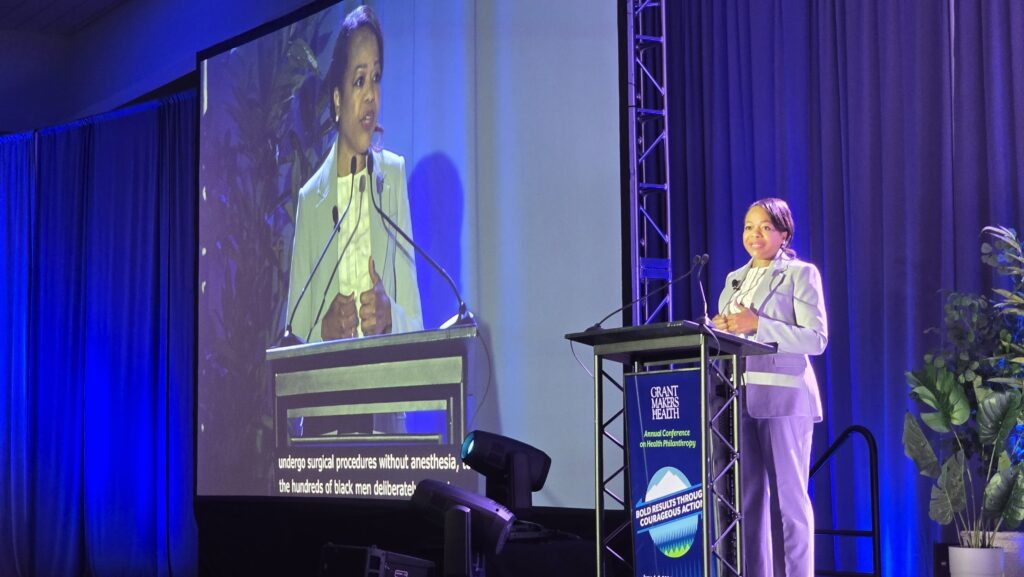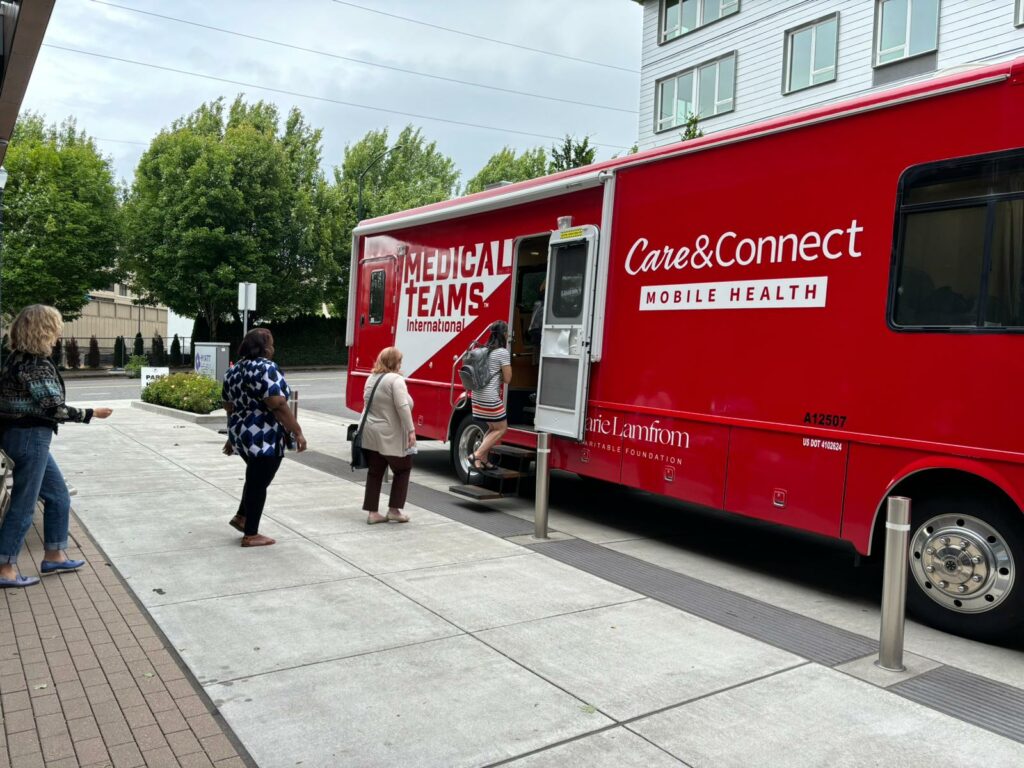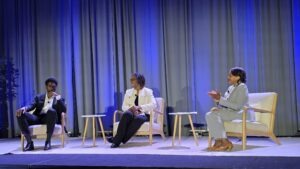“As we celebrate the 60th anniversary of the Civil Rights Act of 1964, I am grateful we have this moment to renew our commitment to promoting justice and equity in our country. I am hopeful about the purpose that brings you to the GIH Annual Conference on Health Philanthropy and am encouraged by the focus on health equity.”
– Kristen Clarke, Assistant Attorney General for Civil Rights, United States Department of Justice

Today we welcomed over 600 attendees and speakers to our boldest Grantmakers In Health (GIH) Annual Conference on Health Philanthropy! The conference officially launched with on-site and off-site experiences to introduce attendees to Portland, community organizations, and local health initiatives. GIH Board members and staff warmly welcomed conference newcomers and left them with advice applicable to all attendees: Don’t hesitate to meet new people at the conference. These connections and shared ideas will outlast your time in Portland and advance a movement for health equity.
From our opening plenary, Keeping Our Eyes on the Prize: 60 Years After the Civil Rights Act with Assistant Attorney General for Civil Rights Kristen Clarke, to dozens of Quick Takes and Learning Labs, Day 1 was filled with ways to reflect on the state of philanthropy and plan for a critical year ahead. Read the daily recap to learn more about a dynamic first conference day!
Opening Plenary: Keeping Our Eyes on the Prize: 60 Years After the Civil Rights Act
2024 is a critical inflection point for our country, with ripple effects on health equity and philanthropy. As we celebrate the 60th anniversary of the Civil Rights Act of 1964, Cara V. James, President and CEO of Grantmakers In Health, asked attendees to reflect on what we have learned since its passage and how philanthropy can support emerging movements today. Earlier this year, philanthropy stalwart Janine Lee, President and CEO of Philanthropy Southeast, passed away. James shared that Janine considered philanthropy to be a unifying force for society and an engine of systemic change. As we begin the 2024 GIH Annual Conference and prepare for a complex year ahead, James encouraged everyone to keep Janine’s insights, ambition, and spirit in mind as we strive for health equity.
Kristen Clarke, Assistant Attorney General, Civil Rights Division U.S. Department of Justice, detailed how philanthropy can be a force for change with today’s opening plenary, Keeping Our Eyes on the Prize: 60 Years After the Civil Rights Act. Health inequity was a core motivator of the passage of the Civil Rights Act, with groups like the Medical Committee for Civil Rights ensuring that access to health care remained a priority of the movement. Dr. Martin Luther King even stated, “Of all the forms of inequality, injustice in health care is the most shocking and inhumane.”
The passage of the Civil Rights Act provided a foundation for the tools that address inequalities in health care today. Yet, even with so much progress, many Americans are impacted by barriers to health care and remain distrustful of public health authorities. At the Civil Rights Division of the U.S. Department of Justice, equal access to health care and health equity are priorities to not only undo years of injustices, but also to emphasize that health care is imperative to address intersectional inequity. Kristen Clarke outlined how the Department has combated the discrimination of transgender people seeking gender-affirming care, the stigma of people with addiction, and the criminalization of mental illness and disability in recent years. She reaffirmed that the Civil Rights Act, alongside the Voting Rights Act of 1965, Fair Housing Act of 1968, and Americans with Disabilities Act, provides an important foundation to fight discrimination, safeguard constitutional rights, and ultimately ensure better health for all.
In this election year, Clarke emphasized that we must band together to protect our most important civil right—the right to vote. Voting ensures that “all critical threads that bind us together in the great quilt of American democracy,” from housing to health care, are protected, amplified, and progressed. Cara James and Lerone A. Martin, Martin Luther King, Jr. Centennial Professor and Associate Professor of Religious Studies at Stanford University, then joined Clarke for a deeper dive into how funders can pull these threads together and ensure a stronger democracy.
Philanthropy has the potential to bring disparate voices together to create large-scale social change. Lerone A. Martin noted that initially civil rights groups had different priorities and were uninterested in convening. It was a single philanthropic foundation that brought groups together to see a common cause, which then produced the historic 1963 March on Washington. He encouraged attendees to use their “time, talent, and treasure” to bring community leaders and organizations together to address problems of inequity nationally and on a local level. He reminded the room that behind all freedom fighters, there were “freedom funders” who provided tools for those on the frontline. He invited everyone to join a rich tradition of freedom funders, the essential ingredient for health equity and continued democracy. We know there are forces that continue to tear at our society, and philanthropy can facilitate dialogue and promote the healing we need in our country today.
In addition to the opening plenary, conference attendees joined site visits across the Portland area—including a tour of the Recuperative Care Program, a visit to Relief Nurseries and Native American Rehabilitation Association of the Northwest (NARA NW) Youth Addictions Treatment Program, a neighborhood-based learning tour with Coalition for Communities of Color, and a visit to a hospital-linked violence intervention program called Healing Hurt People (HHP). The afternoon’s Learning Labs and Quick Takes offered timely models for innovation and change in health and philanthropy.

On-Site Experience: Care & Connect Mobile Health
Care & Connect Mobile Health drove right up to the Hyatt Regency for an on-site experiential learning opportunity. Medical Teams International, a Portland-based medical care nonprofit organization, operates 13 mobile health vans to provide dental and health care to underserved, underinsured, or uninsured and high-risk populations in Oregon and Washington. The volunteer-based team provided an overview of operations and services, emphasizing that dental care is systemic care. As part of their work, they ensure patients can access a range of services from mental health screening to vaccinations, provide referrals to ongoing medical care, give patients tools and education to advocate for their care, and most importantly build trust with communities. Attendees walked through one of the mobile units and spoke directly to staff about their experiences serving thousands of patients per year.
Newcomers Welcome Lunch
Conference newcomers packed the Deschutes Ballroom to learn more about GIH, the conference, and each other. Laura Gerald, President of Kate B. Reynolds Charitable Trust and GIH Board Chair, provided a warm welcome and encouraged attendees to connect with GIH Board and staff members throughout the conference. Cara V. James, President and CEO of GIH, offered an introduction to GIH’s 2025 Strategic Plan and core programming and outlined ways attendees can stay connected to GIH and each other throughout the year. Attendees played Getting to Know You BINGO and left with a deeper understanding of GIH’s vision: Better health for all through better philanthropy.
Consulting with Care: It’s Not Always About the Funding
In this session, Carla Gibson, Vice President of Programs at REACH Healthcare Foundation, shared that “solutions come from the community.” To prioritize the community, REACH offers a new way of providing technical assistance to Black-led, Black-serving nonprofits by deploying a cadre of Black consultants in lieu of grant funding. This model grew out of their “Centering Black Voices” pilot which emphasized decreasing infrastructural barriers for Black-led and Black-serving nonprofits, providing unrestricted funding, and prioritizing trust-based philanthropy.
Launched in May 2023, Core Consultants supports grassroots Black-led nonprofits who REACH may not otherwise be able to fund. Nonprofits are able to pick from five consultants across five expertise areas: strategic planning, program and fund development, marketing and communications, accounting and financial services, and grant writing and readiness. The consultants are strategically curated and intentionally local to ensure they truly understand the organizations and can build long-term relationships to make the technical assistance work. The success of Core Consultants emphasizes the immense benefits and positive outcomes of meeting organizations where they are, not where funders want them to be.
This session was designed by REACH Healthcare Foundation.
Oklahoma’s Bipartisan Mental Health Policy Transformation
Zack Stoycoff, Executive Director of Healthy Minds Policy Initiative, launched the session with a big call to action: Do not ignore policy. Policy is how we change our systems and is essential to innovative philanthropy. To understand where philanthropy can be more involved in mental health policy, Stoycoff outlined current challenges of America’s mental health system, from lack of parity in funding to inadequate approaches to serious mental illness and substance use.
To address these challenges, the Anne & Henry Zarrow Foundation in Tulsa, Oklahoma committed to not just funding, but also listening to and empowering the community. Through a partnership with the University of Tulsa – Urban Institute, the Healthy Minds Policy Initiative was born in 2019 to defeat untreated mental illness. Originally focused on the Tulsa area, Healthy Minds now operates statewide with employees and projects across Oklahoma.
Effective systems change includes research, policy, and community. By activating these key pillars of change and creating a local culture of problem-solving, Healthy Minds learned that bipartisan policy reform on mental health and substance use is possible, even in a deeply partisan state. Since launching, Healthy Minds has released 60 pieces of original research and had 12 bills signed over five legislative sessions, but most importantly has secured public investments in a historically underfunded state and local mental health system.
To make mental health policy the focus of your own philanthropic work, Stoycoff encouraged attendees to:
- Forward the right local faces
- Appeal to policymakers, not advocates
- Focus on non-mental health influencers
- Defuse territorialism by drawing in new resources
- Understand the full advocacy landscape
This session was designed by The Anne & Henry Zarrow Foundation and the Health Minds Policy Initiative and supported by The Arthur M. Blank Family Foundation.
Optimizing Health and Well-Being Later in Life through the Older Americans Act and Beyond
Lindsay Goldman, President and CEO of Grantmakers In Aging, and Cara V. James, President and CEO of Grantmakers In Health, introduced the session by highlighting the Older Americans Act (OAA) partnership between the two organizations. The partnership formed from the unavoidable reality that our population is aging. Aging is a great victory for public health, but America’s structures and institutions are not equipped for the demands and needs of older Americans, especially in rural, low-income, and ethnically diverse communities. Millions of people are not getting the care they need today, and more and more people are aging into poverty and homelessness. With the OAA up for reauthorization in 2024, funders can play a critical role in advancing a conversation around aging and amplifying the importance of this legislation.
At this session for the “aging curious” and “aging adjacent,” expert panelists from Cambia Health Foundation, the National Council on Aging, The SCAN Foundation, and Washington County Health discussed the intricacies of supporting an aging population. Panelists dove right into what needs to happen now to change the conversation and the outcomes around aging. They agreed that aging needs to be repositioned in the United States; aging is exciting. However, our care system is fragmented and makes opportunities like Medicaid and Medicare feel impenetrable. We need to prioritize integration of care and more equitable approaches that focus on the individual, to support the idea of aging as a gift, not a burden. There also needs to be longer-term investments in prevention and an expanded multisector plan for aging.
A long-term and strategic investment is essential to ensure programs for aging populations thrive. Panelists agreed that philanthropy can make multisector conversations more robust and accessible and also amplify the outcomes of private-public partnerships that may be unknown to long-standing organizations. Panelists offered a series of recommendations for funders about how aging in America works and how funding can prepare for the long game:
- Remember that all funders are working in aging. All funding work is interrelated. Aging is all of us.
- Prioritize conversations between Area Agencies on Aging and private funding.
- Amplify your funding work to organizations and programs that have long-standing aging initiatives.
- Look to local nonprofits that provide aging services for creative approaches and passion.
- Connect with the community and leverage local relationships. Know where older adults are located and regularly assess their needs.
- Think creatively about how to break down state barriers.
- Scale the innovation and models that work and think about new partnerships with small businesses, the arts, agriculture, tech, and more.
This session was supported by the Archstone Foundation, the Cambia Health Foundation, The John A. Hartford Foundation, the Health Foundation for Western & Central New York, the Moses Taylor Foundation, the New York Community Trust, Point32Health Foundation, Research to Prevent Blindness, The Fan Fox and Leslie R. Samuels Foundation, St. David’s Foundation, and the Ralph C. Wilson, Jr. Foundation.
Housing Justice is Health Equity: Mobilizing Assets to End Homelessness
According to the November 2023 U.S. Playbook to Address Social Determinants of Health, housing insecurity has an important impact on health and well-being. But Michael Durham, Director of Networks at Funders Together to End Homelessness, reminded attendees that social determinants are neither social nor determinants, but that they are structural impediments born out of conscious policy decisions. Contending that every health funder can support the movement and advocacy within their existing portfolios, the session offered three distinct perspectives on funding for housing justice and health equity today.
Elisa Harrigan from Funders for Housing and Opportunity (FHO), discussed convening and collaborating as one of the key ways of engaging in the housing crisis. FHO exists as a funder pool and learning network, where funding and impact can move quicker than an individual philanthropic body. A key takeaway of the work is to deepen partnerships between housing and other issues to catalyze transformative community-driven solutions because “a systemic problem requires a systemic response.”
Brittney Daniel from the California Community Foundation discussed bridging gaps between health and housing through the promise, pitfalls, and potential of CalAIM (California Advancing and Innovating Medi-Cal), a multi-year plan to transform California’s Medi-Cal program and to make it integrate more seamlessly with other social services. To support this initiative, the California Community Foundation’s Health Team’s Strategies funds nonprofits that deliver integrated primary, mental health, and substance use services to those most vulnerable; organizations to increase use of coverage and expanded public benefits; and policy and advocacy for health coverage for undocumented people.
Blair Harvey from the Michael Reese Health Trust offered two case studies to drive home the essential work of recognizing homelessness as a public health issue: Chicago Funders Together to End Homelessness, a local network of 30+ Chicago-area funders with a primary focus on housing justice and ending homelessness for communities of color, and Bring Chicago Home, an advocacy and lobbying organization to create a dedicated revenue line for permanent housing and support services in Chicago, led by community members and built by experts who have experienced homelessness.
Elisa Harrigan ended the session with a clear reminder: “As you are organizing in your field, make sure people understand the legacy of racism within the practices and policies that exist within housing. It’s going to take a while to get out of [this crisis]. Think about the ways we can reimagine and transform this system. Make sure we are acknowledging the long history, which requires long-term solutions.”
This session was designed by Funders Together to End Homelessness.
On the Ground
After a full day of meaningful sessions, attendees gathered for a lively kickoff reception where they deepened their connections and learnings. With a verdant backdrop of Portland’s unique flora and fauna, attendees enjoyed light bites and toasted to a successful first day of the conference.
“This is my first time at the GIH Annual Conference and I was really impressed by the site visit I attended at the Native American Rehabilitation Association of the Northwest (NARA NW) Youth Addictions Treatment Program. I really appreciated how much love and care went into the young people in the program. Seeing the facilities and hearing from the staff made the impacts of funding real to me. I also loved the session on the Older Americans Act. I learned about some innovative funding initiatives that I plan on sharing with my colleagues.”
– Hazel Paguaga at The Funders Network
“This is also my first time at the GIH Annual Conference. I appreciate the intentional design of the conference. Something that has been inspiring to me is the diversity of people at the conference, and also the diverse and thoughtful approach to programming, from the site visits to the networking breaks.”
– Angel Villalobos of Change Matrix
Fun fact: The Portland Gay Men’s Chorus is the fourth oldest gay-identified chorus in the country.
Follow all the conference activities on GIH socials and the official GIH Annual Conference app.
Facebook | LinkedIn | Instagram | Conference App

